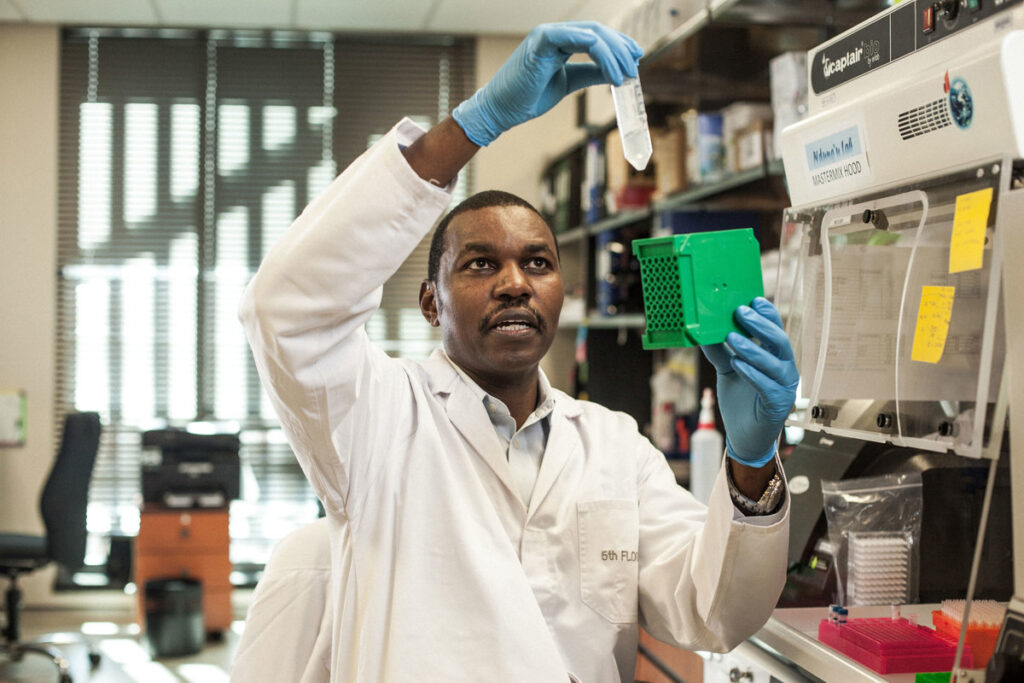In a groundbreaking development for HIV research, Kenya’s Professor Thumbi Ndung’u Leads Groundbreaking HIV Cure Trial in South Africa.
Kenyan scientist Professor Thumbi Ndung’u is leading a revolutionary trial at the University of KwaZulu-Natal in South Africa. The study, aimed at finding a functional cure for HIV, has yielded remarkable results, with 20% of participants able to suppress the virus without medication for nearly a year. The trial, conducted by the Africa Health Research Institute, represents a significant breakthrough in global HIV treatment and offers new hope for millions living with the virus.
A New Approach to HIV Cure
Professor Thumbi Ndung’u and his team have been exploring an innovative approach known as combination immunotherapy. Unlike traditional antiretroviral therapy (ART), which requires lifelong adherence, this method aims to help the immune system control the virus without ongoing medication. The trial participants, who started ART soon after acquiring HIV, were later given immune-boosting treatments to enhance their body’s ability to fight the virus. Under medical supervision, they then stopped ART to see if their immune systems could maintain control independently.
The results, presented at the 2025 Conference on Retroviruses and Opportunistic Infections (CROI) in San Francisco, revealed that 30% of participants (six out of 20) managed to stay off ART for nearly a year. Even more impressively, 20% (four individuals) remained off treatment for 55 weeks and continued without medication for an average of 1.5 years. This marks a major step forward in HIV cure research.
Significance of the Study
Although the majority of participants could not sustain viral suppression without ART, the findings remain highly significant. The ability of even a small percentage to control HIV independently suggests that further refinement of combination immunotherapy could lead to more effective treatments.
“This is an important development,” Professor Ndung’u explained. “Understanding how these individuals managed to suppress the virus without ART will help scientists refine cure strategies and develop improved treatment approaches.”
The study also underscores the feasibility of conducting complex HIV cure research in resource-limited settings. “Africa has the highest burden of HIV, and it is crucial that scientific advancements include African populations,” Ndung’u emphasized.
A Pioneer in HIV Research

Professor Ndung’u has long been at the forefront of HIV research. Born in Kenya, he holds a Doctor of Philosophy (PhD) in Biological Sciences in Public Health from Harvard University and a Bachelor of Veterinary Medicine (BVM) from the University of Nairobi. His career has been dedicated to developing vaccines and therapeutic strategies for both HIV and tuberculosis (TB).
Currently, he serves as a leading researcher at the Africa Health Research Institute and The Ragon Institute of Mass General Brigham, MIT, and Harvard. His work focuses on immune-based interventions for infectious diseases, with an emphasis on improving health outcomes in Africa. In 2023, he was honored with the Leadership in Public Health Practice Award from Harvard University’s Public Health Alumni Association, recognizing his contributions to global health research.
Global Collaboration in HIV Cure Research
Beyond his work in South Africa, Ndung’u has played a key role in shaping global HIV research strategies. Recently, he participated in a groundbreaking event in Nairobi, Kenya the Consensus Workshop on Analytical Treatment Interruption (ATI) in HIV Cure Trials. Hosted by the Sub-Saharan African Network for TB/HIV Research Excellence (SANTHE) and the US Military HIV Research Program, the workshop gathered experts from five continents, including community advocates, scientists, and policymakers.
Over three days, participants discussed new international guidelines to standardize ATI trials, ensuring they are ethically sound and effective. “The collaboration and insights shared during this workshop will undoubtedly enhance our efforts to find a cure for HIV,” Ndung’u noted.
The Future of HIV Cure Research
The findings from the KwaZulu-Natal trial bring fresh optimism to the global fight against HIV. While ART has successfully controlled HIV for millions, a cure remains the ultimate goal. Studies like this demonstrate that long-term remission without medication is possible and may become a reality for more people with further research.
“We are making incredible progress,” Ndung’u affirmed. “Every breakthrough strengthens our commitment to pushing the boundaries of scientific research and improving health outcomes for all.”
The success of this trial is expected to pave the way for larger studies that could refine and expand immunotherapy strategies. If future trials confirm these results, combination immunotherapy could revolutionize HIV treatment and bring the world closer to a functional cure.
Conclusion
Professor Thumbi Ndung’u’s pioneering work offers a beacon of hope in the global battle against HIV. By leading groundbreaking research, advocating for African involvement in scientific advancements, and fostering international collaboration, he is helping to reshape the future of HIV treatment. As further trials are conducted, the world watches with anticipation, hoping that a permanent solution to one of the most pressing global health challenges is within reach.
For now, the results from South Africa’s HIV cure trial serve as an inspiring milestone, proving that innovation and perseverance can bring us closer to a future free from HIV.


